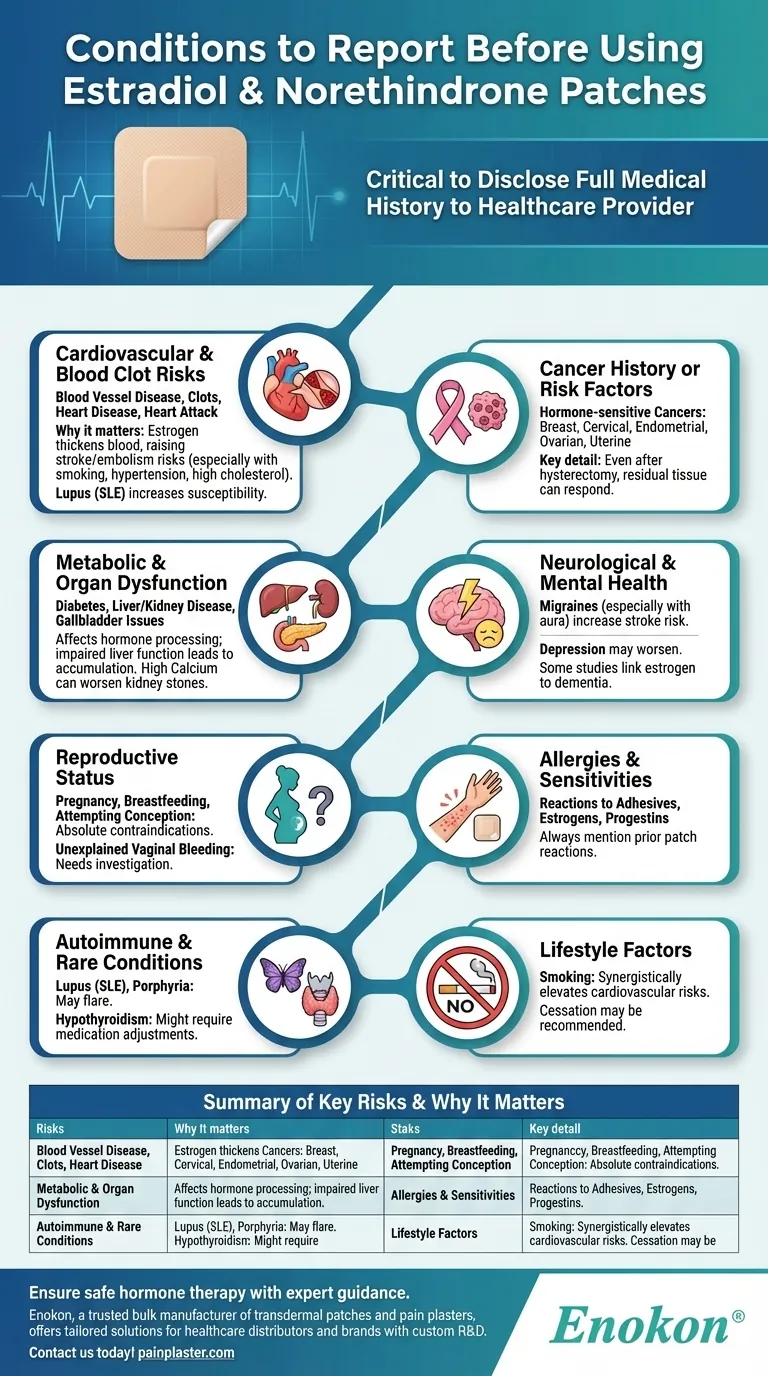Before using medicine patches containing estradiol and norethindrone, it's critical to disclose your full medical history to your healthcare provider. These patches deliver hormones that can interact with or exacerbate existing conditions, ranging from cardiovascular issues to cancer risks. The decision to use them requires careful evaluation of individual health factors to balance benefits against potential complications.

Key Points Explained:
-
Cardiovascular and Blood Clot Risks
- Conditions like blood vessel disease, history of blood clots, heart disease, or recent heart attack must be reported. Hormonal patches can increase clotting risks, especially in smokers or those with hypertension/high cholesterol.
- Why it matters: Estrogen can thicken blood, raising stroke or pulmonary embolism risks. For example, a patient with lupus (SLE) may already have elevated clot susceptibility.
-
Cancer History or Risk Factors
- Disclose any history of hormone-sensitive cancers (breast, cervical, endometrial, ovarian, or uterine). Estradiol may stimulate cancer cell growth.
- Key detail: Even past hysterectomy patients need evaluation—residual tissue could respond to hormones.
-
Metabolic and Organ Dysfunction
- Diabetes, liver/kidney disease, or gallbladder issues affect how the body processes hormones. Impaired liver function may lead to drug accumulation.
- Example: High calcium levels (hypercalcemia) with estradiol can worsen kidney stones.
-
Neurological and Mental Health
- Migraines (especially with aura) increase stroke risk when combined with estrogen. Depression may worsen due to hormonal fluctuations.
- Consideration: Some studies link estrogen to dementia progression in susceptible individuals.
-
Reproductive Status
- Pregnancy, breastfeeding, or attempts to conceive are absolute contraindications due to fetal harm risks. Unexplained vaginal bleeding may indicate underlying pathology needing investigation before patch use.
-
Allergies and Sensitivities
- Allergic reactions to adhesives, estrogens, or progestins (like norethindrone) can cause skin irritation or systemic responses. Always mention prior patch reactions.
-
Autoimmune and Rare Conditions
- Lupus (SLE) or porphyria may flare with hormonal changes. Low thyroid levels (hypothyroidism) might require dosage adjustments for other medications.
-
Lifestyle Factors
- Smoking synergistically elevates cardiovascular risks. Providers may recommend cessation before prescribing.
By systematically reviewing these factors, healthcare providers can tailor treatment plans—whether adjusting doses, choosing alternative therapies, or implementing closer monitoring. This collaborative approach ensures safer use of hormone-delivering medicine patches in managing menopause symptoms or other conditions.
Summary Table:
| Condition Category | Key Risks to Report | Why It Matters |
|---|---|---|
| Cardiovascular | Blood clots, heart disease, hypertension | Estrogen increases clotting risks, especially in smokers |
| Cancer | Breast, cervical, or uterine cancer history | Hormones may stimulate cancer cell growth |
| Metabolic | Diabetes, liver/kidney disease | Impaired organ function affects hormone processing |
| Neurological | Migraines with aura, depression | Higher stroke risk; mood fluctuations possible |
| Reproductive | Pregnancy, unexplained vaginal bleeding | Hormones can harm fetal development |
| Allergies | Reactions to adhesives or hormones | Risk of skin irritation or systemic responses |
| Autoimmune | Lupus (SLE), porphyria | Hormonal changes may trigger flare-ups |
| Lifestyle | Smoking | Synergistically increases cardiovascular risks |
Ensure safe hormone therapy with expert guidance. Enokon, a trusted bulk manufacturer of transdermal patches and pain plasters, offers tailored solutions for healthcare distributors and brands. Our technical expertise in custom R&D ensures optimal formulations for your needs. Contact us today to discuss your requirements!
Visual Guide

Related Products
- Far Infrared Deep Heat Relief Patches Medicated Pain Relief Patches
- Capsaicin Chili Medicated Pain Relief Patches
- Asthma Cough and Pain Relief Patch for Adults and Kids
- Prostate Pain Kidney Health Care Patch for Men
- Heating Pain Relief Patches for Menstrual Cramps
People Also Ask
- How do Deep Heat Pain Relief Patches provide pain relief? Discover the Drug-Free Mechanism
- How often should pain relief patches be used? Get the Right Schedule for Targeted Relief
- How does the Deep Heat Back Patch work? A Drug-Free Solution for Targeted Pain Relief
- How effective are pain relief patches for muscle pain? Target Localized Pain with Transdermal Delivery
- How do pain relief patches compare to other pain relief methods? Discover Targeted, Long-Lasting Relief














